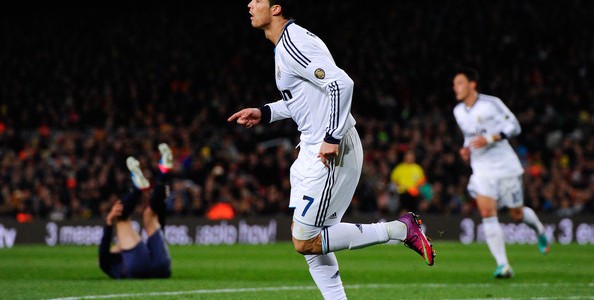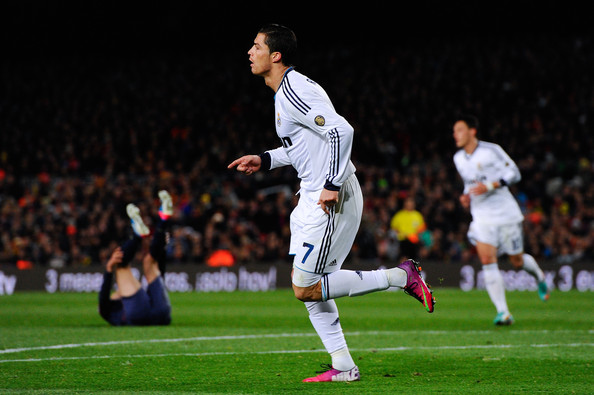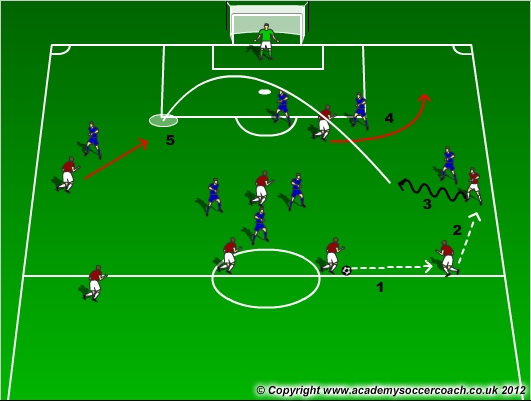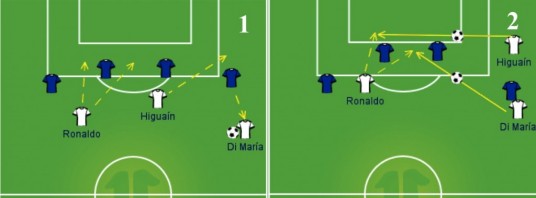There’s something about the Nou Camp that makes Cristiano Ronaldo bring out the best of him, unlike his first two seasons with Real Madrid, or when he visited there with Manchester United. Despite some opinions earlier this season, Ronaldo is only getting better as a finisher and a player, something that began even before he came to Spain.
When Cristiano Ronaldo made his debut for Manchester United in 2003, he was an amazing teenage dribbler, but nothing more. His first few seasons in England were spent on the wing, and when you often look at Nani today, at his best and worst, you see the younger Ronaldo. Fast, with guile and incredible dribbling, but often not the role model for effectiveness.
Than 2007 came, and his progression as a footballer along with his physical growth and improvement turned him into the most deadly finisher in the Premier League, maybe in Europe. He scored 31 goals in 34 matches for United, a record for a non-striker, although the way Ronaldo has been playing since that move by Ferguson isn’t exactly a classic winger as well.
Ronaldo moved on to Real Madrid and the Spanish La Liga. You might argue that it’s simply easier to do so well in Spain when compared with the Premier League, but that’s beside the points. The numbers suggest that aside from Lionel Messi, Ronaldo is the best scorer in the world with 136 league goals over his 125 league matches with Real Madrid; 185 goals in 183 matches when you take into account all competitions. The key? Being cost effective.

Ronaldo’s positioning on the pitch remains on the wing, but that’s only a starting point. During his last two seasons at the Old Trafford, he was given a free role, more or less, usually playing at the front of the attack, only coming from the left side to begin, but ending up pretty much anywhere around the box, unless he chooses to shoot from a distance.
Under Jose Mourinho and Manuel Pellegrini, Ronaldo continued to evolve. This also has to do with him no longer getting foolish red cards for cheap shots at other players, often as a retaliation when he feels he doesn’t get enough protection from the referees. Trying to fool referees by diving (minor diving) or false claims for handballs aren’t going to change, something he probably can’t control, coming with his passion for the game.
Ronaldo started his career as a right winger, but his initial position these days is on the left. One of Real Madrid’s basic plans of attack is building up through the right, with Angel Di Maria or Mesut Ozil controlling the ball, while one of the more natural strikers, Benzema or Gonzalo Higuain, draws one of the central defenders away from the middle of the box.
It’s almost impossible to beat Ronaldo in speed and power, and he often begins a sprint to beat the full back before making a surprising cut to the middle, which has been left open by off the ball movement from one of the strikers. As the pie chart above displayed, it’s not about Ronaldo dribbling and beating defenders on his own – it’s about being clinical and reacting quickly to situations.
That isn’t the only method of scoring, however. Ronaldo is fantastic in the air, and the threat of him running between the full back or the two centre back is quite a cause for concern for many defenses. When he does rise to the air for the header, it’s often when two defenders aren’t quite sure who is marking him while he reacts quicker than anyone.
There’s also the option of one of the strikers moving to the wing, although Benzema does this better than Higuain. Ronaldo shifts to the right along with him, finding himself in the middle of the box, usually ready to react much quicker to a low incoming cross.
No one is unstoppable. Right Backs on their own usually can’t do the job, and it takes another centre back or defensive midfielder to make life as hard as possible for Ronaldo, who’ll still get a few shots on target anyway. As long as they’re relatively contested, that’s the most you can ask of your defense.
That still leaves quite a lot of talent to worry about, but Real Madrid haven’t been consistent in the support they’ve been giving their star player this season on the field; a big reason of why they seem to play very well in big games, when the focus and preparation are at their best, but fail miserably more than once against weak opposition on the road, allowing Barcelona to run away with the La Liga title.



